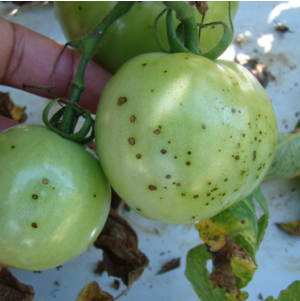By Clint Thompson

Florida tomato growers need to be more efficient with their fungicide sprays for target spot disease.
According to Gary Vallad, professor of plant pathology at the University of Florida Institute of Food and Agricultural Sciences (UF/IFAS) Gulf Coast Research and Education Center in Wimauma, Florida, producers are currently spraying too many times when they don’t have to.
It is a common mistake that can be easily remedied.
“With target spot, we’ve got a lot of great chemistries available. What we’re really trying to do is improve the timing of when we apply them. We’re trying to move away from that calendar system where we’re relentlessly hitting the plant and then running out of active ingredients at the end of the season when you really need it the most,” said Vallad, who spoke about target spot at the Florida Tomato Conference. “We pretty much have some great evidence to show, it’s not really protecting the canopy as much as it is reducing the amount of sporulation within the canopy. It’s the sporulation that ends up getting on the fruit and penetrating the fruit.
“It’s improving that timing and understanding those conditions that favor target spot.”
According to UF/IFAS, lesions from target spot disease can form on the plant roots, stems and leaves and also on the fruit. Leaf lesions can develop quickly and lead to blighting and premature defoliation. Target spot thrives in temperatures between 83 degrees Fahrenheit (F) and 90 F with high humidity. Continuous leaf wetness is key for the spores to germinate and infect the tomato plant.
The best time to apply fungicide sprays is when conditions are favorable for the disease to develop.
“If you have favorable conditions for the disease to develop, it’s going to be during canopy closure or past that. That’s when the inside of that canopy can stay really wet. It really coincides, at least in Florida, when you get that first cold front; the dew stays really high. The inside of that plant, with the way we tie our plants, it just stays wet in there,” Vallad said.
Gary Vallad is a professor of plant pathology at the University of Florida Institute of Food and Agricultural Sciences (UF/IFAS) Gulf Coast Research and Education Center. To learn more about research going on at the GCREC, join us at the Florida Ag Expo on Nov. 9.

